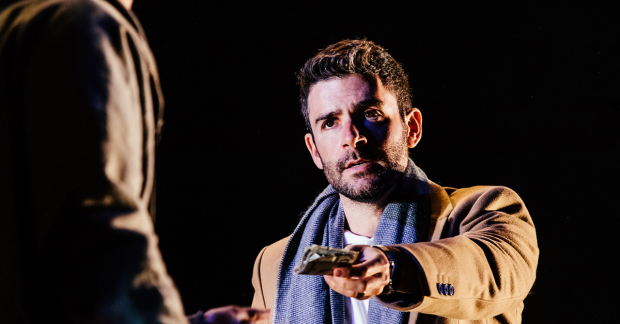Interview: Adam Kantor Talks About the Catharsis of His Role in The Inheritance
Matthew Lopez’s Tony-winning play is running at the Geffen Playhouse in LA.
New York theater audiences cherish Adam Kantor for his work in musical theater, ranging from his stellar performances as Jamie in Second Stage's revival of The Last Five Years to Motel in Fiddler on the Roof to Telephone Guy in The Band's Visit.
Currently, Los Angeles audiences are witnessing a different side of Kantor in the leading role of Eric Glass, a thritysomething gay man navigating difficult relationships in Matthew Lopez's Tony Award-winning two-part drama The Inheritance – Parts 1 and 2 at the Geffen Playhouse. Kantor recently spoke to TheaterMania about working on this remarkable play.

(© Jeff Lorch)
This interview has been condensed and edited for clarity.
What is about the play, and specifically the role of Eric, that made you want to invest so much time in this production?
There's a line in Part Two of The Inheritance that reads: "He thought of the explorers who first encountered the Grand Canyon. Their first thought must have been 'Oh wow' and their second was 'Oh, fuck, how do I get around that thing?'" That's how I felt when I was first gifted the opportunity of doing this play. The line is actually Toby's — relating to him finally facing himself — but it seems kind of fitting for my own moment when considering diving into Eric. How do I traverse something so gargantuan, so epic (on so many levels), so personal, and so deeply layered? Am I ready to peel that onion?
Would you say it scared you?
Yes, it scared me. Not because it felt foreign, but because of how close-to-home it felt. I knew it'd require a level of emotional vulnerability and spiritual excavation that my life was leading me towards. Which is why I had to do it.
How did you prepare, both mentally and physically, to play Eric?
With Eric, I know I have the rare opportunity of "showing up" in a way I've never felt before. He and I share so much — to the core of our beings. The challenge and the opportunity are to be as unmasked, as present, and vulnerable as I can allow myself to be. It's a journey of authenticity.
The argument that Eric's journey makes, in a way, is that this kind of authentic presence and spiritual excavation can be healing for others. In the play, Morgan says, "If we are to learn what we mean to each other, we must first examine what we mean to ourselves. And we must be fearless and honest in that attempt." That's my exercise nightly — to show up for myself so I can show up for others (on stage and off).
Practically, offstage, I suppose that means therapy and meditation, among other things. I do a loving-kindness meditation before each show — for my company, for the audience, and for myself.
I am assuming, like in NYC, the final scene in Act One prompts a visceral reaction from the audience. How does the audience's reaction affect your work?
Well, let me tell you, I've never experienced the kind of audible sobbing and often guttural wailing I can hear from the audience. It reverberates through all of us onstage.
In rehearsals, I was afraid of taking up the kind of space and time the end of Act One merits. I was worried it might become airy or even indulgent. Our intrepid and intuitive director Mike Donahue assured me that the space would be filled. He was right; he usually is.
All I can say is, if whatever we're doing up there is serving as some sort of channel for the spiritual catharsis that we can feel from the audience (and ourselves), then we are blessed indeed to have that kind of impact on others. Ultimately — and this is something Matthew and Mike knew — it's larger than any of us, and larger than language.
What is it like for you to work with an almost exclusively male cast?
I find myself thinking more about the intergenerational dynamic of this cast. I am learning so much from this group of humans that Mike, Matthew, and Phyllis (our casting director at the Geffen) assembled. This cast is giving raw honesty in a way I've never experienced. They are channeling some spirits — let me tell you— bringing their rich and diverse life experiences (and past-life experiences) and throwing it down on that stage. Indeed, we are all giving 100 percent and then some. I'm so deeply inspired.
How are your days/performances different on nights when you only do one of the play's parts versus days when you do both parts?
It's so rare — for performers and audiences — to get to experience a seven-hour theatrical journey. Not to mention a journey that commands the kind of attention that these plays do. All I can relay is how I feel after I run a marathon, which is like a wrung-out dish rag that didn't know how badly it needed to be squeezed. It's a delicious combination of depleted and filled. Friends who've seen it have relayed the same. It feels like we're all in the same space together. It's group therapy, almost.









